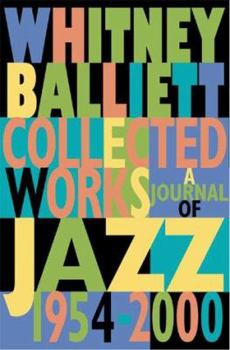Collected Works: A Journal of Jazz 1954-2000
Select Format
Select Condition 
Book Overview
As jazz critic for The New Yorker magazine since 1957, and the author of fifteen books, Whitney Balliett has spent a lifetime listening to and writing about jazz. "All first-rate criticism," he once... This description may be from another edition of this product.
Format:Hardcover
Language:English
ISBN:0312202881
ISBN13:9780312202880
Release Date:December 2000
Publisher:St. Martin's Press
Length:872 Pages
Weight:2.95 lbs.
Dimensions:2.0" x 6.6" x 9.5"
Customer Reviews
5 ratings
You can hear the music...
Published by Thriftbooks.com User , 14 years ago
This is my sixth copy of Ballietts" Collected Works : A Journal of Jazz 1954-2000. I love it that much. Have copies all over the house. Give it as gifts...lasts longer than a bottle of wine. When Balliett writes, you are there. In the club, at the concert, in the studio with the artists. You can hear the music...Miles, Monk, Mable, Bird, Billy, all the greats...and Balliett's not reluctant to write about the not-so greats. It's all there...46 years of JAZZ! The pictures he paints are the portraits of Americas' gift to us all. Buy the book and listen.
Unfortunate title to essential jazz journalism
Published by Thriftbooks.com User , 17 years ago
Whitney Balliett is one of my favorite jazz writers (along with Dan Morgenstern and Ira Gitler), and I've enjoyed reading his pieces in The New Yorker since the 1960s. In the introduction to this book Balliett says he chose the title COLLECTED WORKS because "I like its ring"; that's a bit unfortunate because it gives the wrong impression. These are not his "collected works" but rather, as he again says in the introduction, "a distillation of many of the reviews and critical pieces that I have written about jazz." If you saved most of the original articles as I did, you would have a fairly decent sized pile of pieces that are not included here; perhaps even worse, you would notice that many of the articles appear in the book in truncated form (perhaps that's where the "distillation" comes in). One of the reasons I bought the book was because from its title and size (almost 900 pages) I thought I could take the Collected part literally, and I'd be able to free up some file cabinet space by discarding the original magazine articles. No way. I know this is a personal issue (mainly), but buyers should be aware of what they're getting (or not getting) here. That being said, what you do get is absolutely worth having. Balliett knows the music as well as anyone and describes what he hears clearly and directly. He writes about the entire spectrum of jazz, from the earliest years of the music up into the avant-garde. Besides being deeply appreciative of the jazz masters (Armstrong, Morton, Ellington, Basie, Parker, Rollins, Coleman, to name just a handful) he writes about hundreds of musicians, good, bad, indifferent (but mainly good) who made it onto the jazz scene. He is particularly fond of good drummers (being a drummer himself). Reading The New Yorker you could be almost assured of getting Balliett's perspective on important jazz happenings in (particularly) the NYC area every couple of weeks or so. It was a wonderful steady diet of superb jazz journalism and criticism. It's great to have what's been included between book covers now, and hopefully what's missing gets published in book form some day, too. I really could use that file space.
Wonderful Book on Jazz
Published by Thriftbooks.com User , 18 years ago
I grew up reading Whitney Balliett's pieces in The New Yorker and in anthologies. This book is the motherload--collecting a huge amount of his written jazz work in one place (excluding his wonderful profiles, which are available elsewhere). The work is an insightful and opinionated march through jazz history, written as the history unfolds. Since these acounts were written as players worked, aged and passed on, one gets a real sense of continuity and development in the music and in the people who played it. A must for any jazz fan.
Thrilling
Published by Thriftbooks.com User , 21 years ago
Whitney Balliett is one of the few extraordinary prose stylists of our age. The elegance and acuity of his sentences are practically miraculous. He's virtually without peer.
A National Treasure
Published by Thriftbooks.com User , 23 years ago
OK, Whitney Balliett never got into Miles Davis's electric stuff. So he's a Moldy Fig. To quote Miles, "So What?" For my money, he's still the greatest observer of the modern jazz scene. What makes him great is the accuracy of his observation: No other jazz critic ("Notes and Tones" was written by Art Taylor, a drummer) has been as generous as Balliett at letting the musicians speak for themselves. Reading his reviews, you often forget he's there. That never happens with Stanley Crouch, now does it? I don't like to think about how old Balliett is, nor do I like to think about what jazz criticism will be like without him. By the way: Balliett is not an exclusionary writer. You do not need a Hip Merit Badge to read and enjoy his work. He's a national treasure. Recognize his greatness while he's still here to enjoy it!




